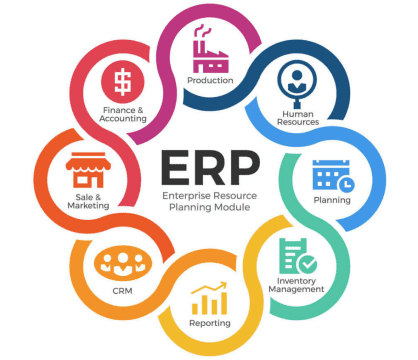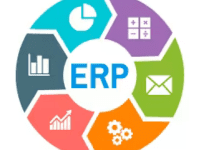20 Benefits of ERP Software | Advantages & Disadvantages of ERP System – Are you tired of feeling frustrated and stuck in your business? Have you been searching for a way to break free from the monotony of inefficient processes?
Look no further, because implementing an Enterprise Resource Planning (ERP) software system can be your salvation.
As businesses grow, managing their operations can become more complex and time-consuming. ERP software is designed to help businesses manage their processes more efficiently and effectively.
In this article, we will delve into the multitude of benefits that ERP software has to offer, and explore the advantages and disadvantages of integrating an ERP system into your business operations. So hold onto your seat, and let’s take this exhilarating ride towards business optimization together!
What is an ERP System?
ERP software is an integrated system that helps businesses manage their operations, including finance, human resources, manufacturing, and supply chain management.
The software provides a central database that can be accessed by different departments, allowing for better collaboration and more streamlined processes.
if the explanation is not satisfactory, see the following discussion regarding What is ERP Software Technology? And what are the Advantages and Disadvantages of the ERP?
Advantages of ERP System

Improved Efficiency
One of the main benefits of ERP software is improved efficiency. The software allows businesses to automate their processes, reducing the need for manual labor and increasing the speed at which tasks can be completed. This can result in significant time savings and increased productivity.
Enhanced Collaboration
ERP software also promotes enhanced collaboration between different departments within a business. By providing a central database that can be accessed by everyone, the software allows for better communication and more efficient sharing of information.
Increased Productivity
By automating processes and enhancing collaboration, ERP software can also lead to increased productivity. Employees can focus on more value-added tasks, rather than spending time on administrative tasks.
Real-Time Insights
ERP software also provides real-time insights into a business’s operations. By integrating data from different departments, businesses can gain a better understanding of their performance and identify areas for improvement.
Better Decision-Making
By providing real-time insights, ERP software also helps businesses make better-informed decisions. The software allows for more accurate forecasting and trend analysis, enabling businesses to make decisions based on data rather than guesswork.
Improved Inventory Management
ERP software can also help businesses manage their inventory more effectively. By providing real-time data on inventory levels and sales, businesses can optimize their inventory levels, reducing the risk of stockouts or excess inventory.
Better Customer Service
ERP software can also help businesses provide better customer service. By providing real-time data on customer orders and interactions, businesses can respond more quickly to customer inquiries and provide more personalized service.
Enhanced Security
ERP software also provides enhanced security for a business’s data. By providing a central database, the software reduces the risk of data breaches and ensures that sensitive information is protected.
Better Regulatory Compliance
ERP software can also help businesses comply with regulations and standards. The software provides real-time data on compliance issues and helps businesses stay up-to-date with changing regulations.
Scalability
Another benefit of ERP software is its scalability. As businesses grow, the software can grow with them, providing additional functionality and resources as needed. This ensures that businesses can continue to meet their evolving needs and remain competitive in their industries.
Reduced Costs
ERP software can also help businesses reduce costs. By streamlining processes and automating tasks, businesses can reduce their reliance on manual labor, resulting in cost savings. Additionally, the software can help businesses optimize their inventory levels and reduce the risk of stockouts, further reducing costs.
Better Resource Utilization
ERP software also helps businesses better utilize their resources. By providing real-time data on resource availability and demand, businesses can optimize their resource allocation, ensuring that they are used as efficiently as possible.
Streamlined Processes
ERP software streamlines processes by automating tasks and reducing the need for manual labor. This can result in significant time savings and increased efficiency, allowing businesses to focus on more value-added tasks.
Improved Supply Chain Management
ERP software also improves supply chain management by providing real-time data on inventory levels, production schedules, and shipping statuses. This enables businesses to optimize their supply chain and reduce the risk of delays or stockouts.
Improved Forecasting
ERP software provides businesses with real-time data on their operations, enabling them to make more accurate forecasts. This can help businesses make better-informed decisions and reduce the risk of costly mistakes.
Better Project Management
ERP software can also help businesses manage their projects more effectively. By providing real-time data on project progress and resource utilization, businesses can optimize their project management and ensure that projects are completed on time and within budget.
Enhanced Data Quality
ERP software provides businesses with a central database that can be accessed by different departments. This ensures that everyone is working with the same data, reducing the risk of errors and ensuring that data is of the highest quality.
Increased Revenue
Finally, ERP software can help businesses increase their revenue. By streamlining processes, reducing costs, and improving efficiency, businesses can focus on growing their operations and increasing their revenue streams.
Disadvantages of ERP Software
20 Benefits of ERP Software | Advantages & Disadvantages of ERP System – ERP software is undeniably beneficial, there are also some drawbacks that businesses must consider. These include the implementation cost, the need for ongoing maintenance, and the potential for resistance from employees who may not be receptive to change.
Ah, the cost of implementation! It can be a daunting prospect, especially for small businesses. However, it is essential to view it as an investment in the future of your enterprise. The benefits of ERP software are vast, and the cost of implementation should be viewed as a necessary expense to remain competitive in today’s fast-paced business world.
Moreover, there is the need for ongoing maintenance, which can be time-consuming and require specialized skills. However, the benefits of the software far outweigh the costs of maintenance. The software enables businesses to streamline their operations, automate mundane tasks, and provide invaluable insights that are crucial to making informed decisions.
Another potential drawback to consider is the resistance from employees who may be resistant to change. It is understandable that employees may feel apprehensive about adopting new technology, especially if it affects their daily work routines. However, it is crucial to communicate the benefits of the software to employees and provide proper training to ensure a smooth transition.
In summary, while ERP software has many benefits, it is essential to consider the potential drawbacks. However, with the right approach, these can be managed effectively, and the benefits of the software can be fully realized.
Conclusion
ERP software, in conclusion, provides businesses with a plethora of advantages, ranging from heightened efficiency, augmented collaboration, amplified productivity, instantaneous insights, and improved decision-making.
Despite the potential drawbacks to consider, the benefits of incorporating an ERP system are colossal. Therefore, businesses that choose to do so can relish improved performance and amplified competitiveness in their respective industries.
Oh, the marvel of ERP software! It is a game-changer for any enterprise seeking to remain relevant in a cut-throat industry. The benefits are boundless, from the seamless automation of daily tasks to the efficient collaboration between departments.
The software provides invaluable insights, enabling businesses to make informed decisions that are crucial to their success. It is, without a doubt, a powerful tool that every company should consider adopting.
However, as with any technological solution, ERP software comes with some potential downsides that businesses must consider.
These include the high implementation costs, complex integration processes, and the need for trained personnel to manage the software. Despite these drawbacks, the benefits of adopting an ERP system far outweigh the risks.
In essence, any company that wants to remain competitive and stay ahead of the curve must consider incorporating ERP software. It is a powerful tool that will streamline operations, improve collaboration, and provide invaluable insights that will enable better decision-making.
The potential risks are minimal when compared to the immense benefits, and the rewards of using an ERP system are immeasurable.
So, dear reader, I implore you to consider incorporating ERP software into your business operations. The advantages are numerous, and the potential risks are minimal. Embrace the power of ERP software, and watch your enterprise soar to greater heights!
FAQs
- How long does it take to implement an ERP system? It depends on the size and complexity of the business, but implementation can take anywhere from a few months to a year or more.
- Is ERP software expensive? Yes, ERP software can be expensive, but the benefits it provides can outweigh the cost.
- Can ERP software be customized to meet the specific needs of a business? Yes, ERP software can be customized to meet the specific needs of a business.
- Can ERP software be used in any industry? Yes, ERP software can be used in any industry.
- Will employees need training to use ERP software? Yes, employees will need training to use ERP software effectively.




